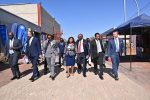In 2024, the mining sector achieved a new record for exploration expenditure, amounting to N$1.23 billion. This accomplishment was commended by the President, H.E. Dr. Netumbo Nandi-Ndaitwah, during a speech delivered on her behalf at the opening of the Chamber of Mines Mining Expo and Conference on Tuesday.
The Mining Expo and Conference, themed “Mining for Namibia’s Future: Job Creation, Local Empowerment, and Economic Transformation,” saw the President highlight the country’s growing prominence as a top destination for mining investment but also issued a strong call for legislative reform.
“This investor confidence is reflected in the actions of Chamber of Mines members, who increased their total exploration expenditure by an impressive 38.1% in 2024,” she said, adding that this is a record since independence.
Nandi-Ndaitwah identified uranium and gold as key sub-sectors driving this growth, attributing the uranium market’s revitalisation to the global push for clean energy.
“The recent recommissioning of the Langer Heinrich Uranium Mine, along with accelerated developments at the Tumas and Etango uranium projects, signals a new era of growth. These projects are not only creating jobs and boosting exports, but also reaffirming Namibia’s strategic role in the global energy landscape,” the President explained.
However, the President’s message also carried a sense of urgency regarding the long-stalled Minerals Bill.
“To fully realise this growth trajectory and maintain our competitive edge, swift progress is needed to finalise the Minerals Bill. This critical piece of legislation will modernise Namibia’s mining framework, making it more transparent, predictable, and fit for purpose,” she emphasized.
It will enhance investment attractiveness by providing clarity on licensing procedures, ownership structures, and regulatory obligations, key decision-making factors for both domestic and foreign investors, she explained.
Meanwhile, Nandi-Ndaitwah also emphasized the need for greater local participation in the mining value chain.
While acknowledging that local procurement already averages between 60% and 80% of total procurement, she called on Namibian entrepreneurs to become “innovators, manufacturers, and commercial partners” to fully benefit from the industry’s growth.
She urged all relevant government ministries, financial institutions, and educational bodies to provide the necessary support, including access to finance and technical assistance, to help Namibians develop viable business proposals.
“The time is now to seize these opportunities, to take ownership, to innovate, and to participate not only as employees but as beneficiaries and business owners in our mining economy,” she said.
According to her, mining will continue to play a central role in advancing our national development agenda by creating jobs, fostering local enterprise, building infrastructure, and contributing to skills development and economic diversification.
This year’s Expo saw remarkable growth in the stature and reach, drawing increasing participation from neighbours in the SADC region and international partners, reflecting Namibia’s rising profile in the global mining landscape.










